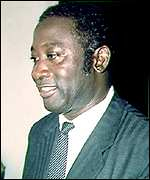ABIDJAN, (Reuters) – Ivory Coast’s Laurent Gbagbo was negotiating the terms of his departure yesterday following a fierce assault by forces loyal to his rival and backed by U.N. and French helicopter air strikes.

But Gbagbo, who has refused to cede power after a U.N. certified election showed he lost to rival Alassane Ouattara, told French TV channel LCI that his army had called for a ceasefire, denying reports he was ready to surrender.
He reiterated that he considered himself the winner of last November’s elections, saying it was not his intention to cling to power to the bitter end.
“I’m not a kamikaze. I love life. My voice is not the voice of a martyr, no, no, no, I’m not looking for death. It’s not my aim to die,” Gbagbo said.
A United Nations internal document seen by Reuters said Gbagbo had surrendered. A U.N. official, under condition of anonymity, said later that Gbagbo had not yet done so but had suggested he wanted to, and had requested U.N. protection.
Gbagbo government spokesman Ahoua Don Mello, who was taking part in the negotiations, told Reuters by phone from Abidjan that the parties were still in talks.
“Some points are still being discussed. Nothing has been signed, Gbagbo has not signed anything,” Don Mello said.
The U.N. document said fighting in Abidjan and elsewhere in the country had stopped since midday local time, and that Ivory Coast’s generals had asked the U.N. peacekeeper force to protect pro-Gbagbo soldiers and take possession of all their weapons.
France said it expected a swift exit by Gbagbo, who had clung to power since refusing to concede he lost last November’s presidential election to Alassane Ouattara, plunging the world’s top cocoa-growing nation into renewed civil war.
“We are on the brink of convincing him to leave power,” French Foreign Minister Alain Juppe told parliament in Paris.
Don Mello said the Gbagbo was negotiating the terms of his departure based on the recognition of Ouattara as president. The spokesman said the negotiations covered security guarantees for Gbagbo and his relatives.
Gbagbo was said to be in Abidjan, with some media reports saying he was in a bunker below his residence.
“It looks like Gbagbo is trying to negotiate his way out. What he can offer is another matter … his negotiating position is much weaker than a couple of weeks ago,” said Hannah Koep, Ivory Coast analyst at London-based consultancy Control Risks. The conflict drove cocoa prices lower on Tuesday as dealers bet on a swift end to Gbagbo’s rule and a resumption of exports. The country’s defaulted $2.3 billion Eurobond rose as the assault raised expectations for repayment.
ARMED MILITIA
Gbagbo’s forces called for a ceasefire after being comprehensively outgunned in the end, and French Defence Minister Gerard Longuet said the West African country’s crisis could soon be over.
However a Western diplomat said sporadic gunfire could still be heard in the well-to-do Abidjan suburb of Cocody. “I spent quite a lot of the day in the cellar again because of fighting at the bottom of the street,” the diplomat said.
“It is clear the situation is not under control. There are lots of pro-Gbagbo militia running around with guns,” he added.
U.S. President Barack Obama called on Gbagbo to stand down immediately and order his fighters to lay down their arms.
Over the past week, forces loyal to Ouattara had launched a major assault on Gbagbo’s last strongholds in Abidjan, driving home their campaign to oust him.
A Reuters eyewitness reported on Tuesday that calm had returned to the district surrounding the presidential palace after days of fierce machinegun and heavy weapons fire.
The U.N. peacekeeping force in Ivory Coast, supported by the French military, had targeted Gbagbo’s heavy weapons capabilities on Monday with attack helicopters after civilians were killed in shelling.
Attacks centred on military bases in the city, but also on rocket launchers “very close” to Gbagbo’s Cocody district residence, U.N. peacekeeping chief Alain Le Roy said on Monday.
The United Nations mission in the country (UNOCI) said Gbagbo’s army chief General Philippe Mangou, and two other generals had requested their men surrender their arms to UNOCI forces and seek protection. A spokesman for Ouattara’s defence ministry told Reuters television there will be no witch hunts and invited pro-Gbagbo soldiers, mercenaries and militia to lay down their arms.
“There will be no witch-hunt,” he said. “The republican forces are organising themselves at present to assure the security of all neighbourhoods that are prey to looting and abuses.”
BULLET-RIDDLED
BODIES
In the north of Abidjan, bullet-riddled bodies lay by the side of the main motorway near the largely pro-Gbagbo neighbourhood of Yopougon, evidence of recent fighting between Ouattara and Gbagbo forces, a Reuters witness said.
An armoured personnel carrier straddled the roadway, still in flames, and residents who had emerged from their houses to find water said they had heard machinegun and heavy weapons rounds through the night.
The United Nations human rights office in Geneva expressed concern yesterday over the killings of dozens of civilians in Abidjan, amid reports of heavy weapons used in populated areas. More than 1,500 people are reported to have died in the standoff that has rekindled the country’s 2002-03 civil war, though the real toll is likely to be much higher.
